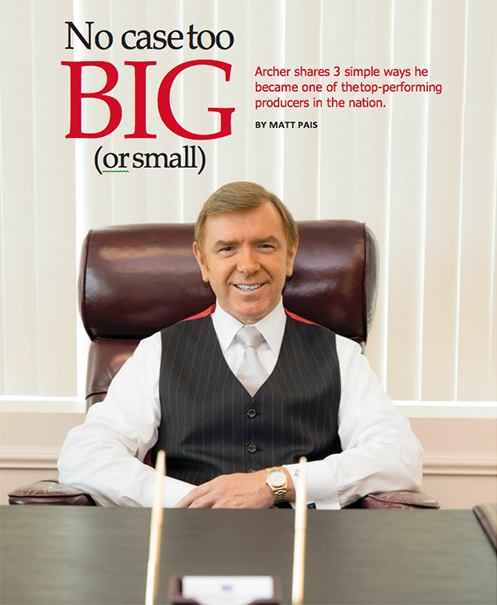
By Matt Pais
Thomas J. Archer, CFP, is scared. The year is 1986, and the now-16-year MDRT member from New York, New York, has been in the financial services profession for two months, making cold calls and selling term insurance to protect mortgages for new homeowners. Pursuing a lead in the rough neighborhood of the South Bronx, Archer enters a building with people fighting and urine in the elevator, where two people try to mug him. “I’m taking my life in my hands here,” thought Archer, who actually grew up not too far away in the same neighborhood. “That was the straw that broke the camel’s back.”
Within another year or so, he’d placed a $100 million universal life policy for a celebrity. Now, a few decades later, Archer is one of the top advisors in the financial services profession — having sold what is believed to be the largest life policy ever written at close to $300 million. He frequently does joint work with advisors who need help with large cases, like one with $265 million of insurance (half whole life and half universal life) that Archer spread among 14 different carriers. His client list of 5,000 includes 18 billionaires, 200 professional athletes and a host of professionals with net worths ranging from $100 million to $500 million.
Archer’s referral-only business includes 20 licensed administrative staff members but no other practicing advisors, and his path to doing estate planning and business succession for some of the most well-known and wealthiest people in the U.S. also hinges on these crucial elements:
1. Being educated and determined. Archer reiterates the need for constant study (for him, that includes tax law, estate planning and business succession issues). In the beginning of his career, Archer didn’t take a vacation for nine years, taking the time to work and learn and set himself apart from advisors who tried to be masters of everything rather than specializing. He now sleeps just three to four hours per night.
2. Being confident and prepared. Archer, who was once on track for a career in professional baseball, said he learned about preparation from his playing days, when he used to take 200 to 300 ground balls and 100 swings every day, so he’d be ready during the game. “For me, being prepared is an obsession,” he said. “You have to know what you’re doing inside and out before you do it.” That means knowing your product, presentation and your client’s problems better than they do.
3. Being mentally tough. “When I first started, I had to kiss a lot of frogs,” Archer said. He’d talk to anyone “who would stand still long enough to talk to him,” and, like everyone, would have applications denied because of clients’ un- recognized health issues. It’s a matter of learning to ask the right questions, Archer said, which comes with time. Archer does sometimes take on smaller cases, ones that take 20 hours rather than 1,000. He knows the importance of helping people who have $50,000 instead of $50 million, and often does work for the less-wealthy family members of his top clients. His outlook is still informed by where he came from and the importance of helping, rather than accumulating.
“Sometimes I’m out with wealthy clients and the dinner bill is $2,000 and in the back of my mind I can’t help but think, ‘Boy, if I sent $2,000 to the Dominican Republic, I could feed 100 kids for a month,’” he said.
In addition to working in his practice, Archer owns a minor league baseball team and is the chief financial officer of Baseball Miracles, a nonprofit organization that provides balls, bats and guidance to children who otherwise wouldn’t have the opportunity to play baseball.
“There are a lot of people in the world who make a lot of money and are very unhappy,” he said. “You have to make sure you don’t trade your life for your balance sheet.”
